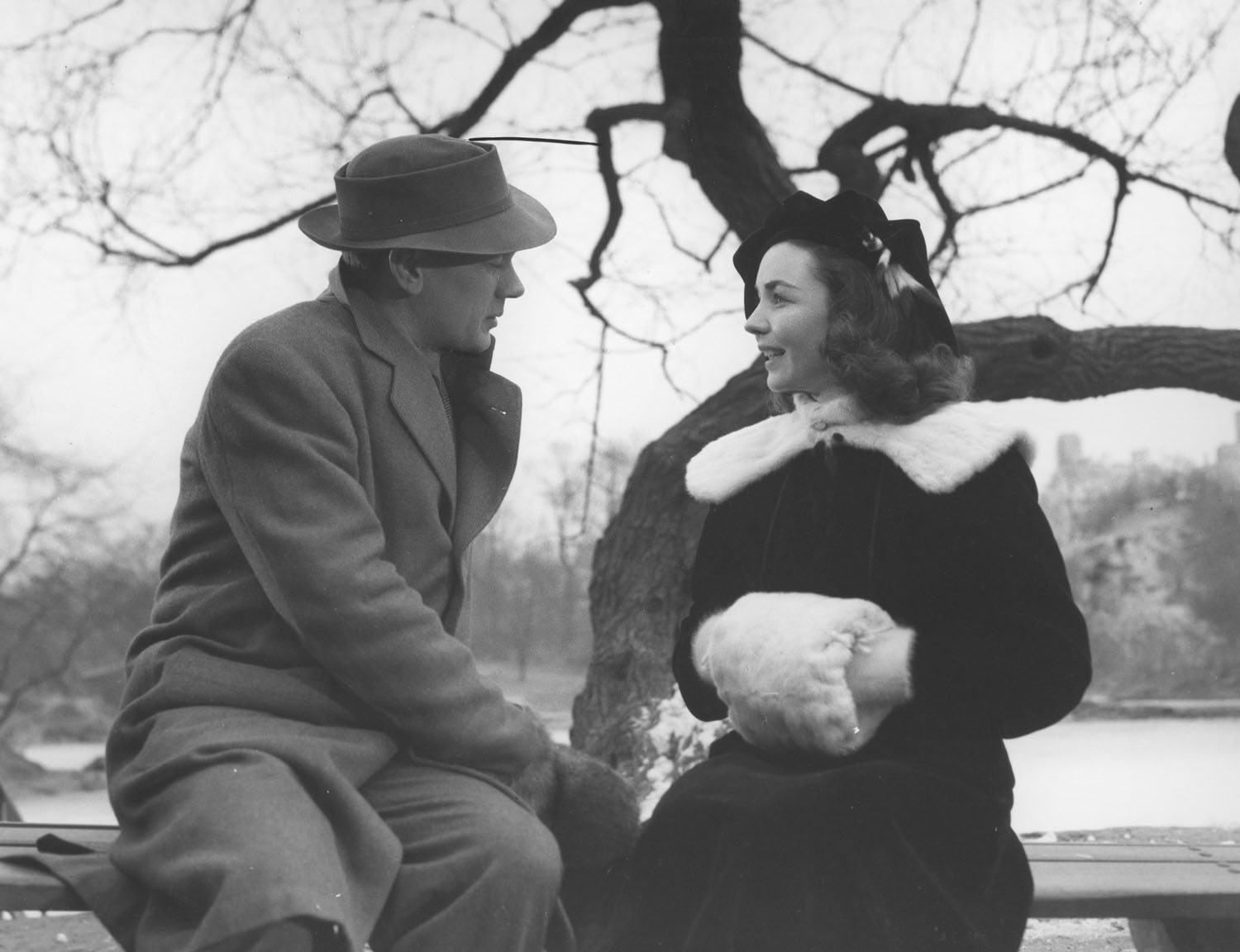 Portrait of Jennie is a dream. Or rather, it seems to spring from that narrow space between sleeping and waking, where the wisps of dreams still cling to you and blend seamlessly with reality. You don’t really watch this film; you drift along with it.
Portrait of Jennie is a dream. Or rather, it seems to spring from that narrow space between sleeping and waking, where the wisps of dreams still cling to you and blend seamlessly with reality. You don’t really watch this film; you drift along with it.
Struggling artist Eben Adams (Joseph Cotten) is alone and lonely, not quite eking out a living in New York City, when he meets young Jennie Appleton (Jennifer Jones) in Central Park. They talk and he finds her chatter fascinating, if a little strange: why does Jennie insist that Kaiser Wilhelm II rules Germany, when it is 1934 and he abdicated decades ago? When Jennie wishes Eben would wait for her to grow up, so they could always be together, Eben looks on in bemusement. Still, she sparks something in him and his sketch of her wins the admiration of art dealers Spinney (Ethel Barrymore) and Matthews (Cecil Kellaway). Excited by his success and keen to paint the girl’s portrait, Eben bumps into Jennie again days later, only to find that she is years older. Just who is Jennie and why is Eben so drawn to her?
This film has its head in the clouds. Literally. The prologue features epigrams from Keats and Euripides superimposed on slow-moving clouds, while an unseen narrator urges us to put aside logic and have a little faith. It is an invitation to slip into a world of mysticism and fantasy, with New York as the canvas for our imagination. In fact, several shots of the city are actually presented as if on a canvas—presumably because that’s how Eben sees the world.
Naturally, Eben’s chief muse is Jennie. With her chestnut hair and doe eyes, Jennifer Jones gives life to this impossible girl—ethereal, innocent and strangely melancholy. Jones had a knack for playing bewitching women and it’s hard to pin down what, precisely, makes her performance so compelling. Perhaps it’s the same spiritual quality she also brought to the amnesiac girl in Love Letters and the long-suffering Bernadette in The Song of Bernadette. When we first meet Jennie, she is putting the finishing touches to a snowman and excitedly rattling on about her friends and family. But suddenly, she starts singing: “Where I come from, nobody knows/And where I am going, anything goes…” It’s a thin, haunting sound that suggests the depth of loneliness behind her smile.
While Jennie may be other-worldly, Eben is decidedly earthbound. I have had a high regard for Joseph Cotten, ever since he sauntered into the offices of the New York Daily Inquirer and reeled off some of Citizen Kane’s best lines. Few actors project sincerity and world-weariness with such ease. Like Gregory Peck, audiences feel comfortable in his presence and empathise with him easily. (Cotten exploited this to wonderfully jarring effect as a charming sociopath in Shadow of a Doubt.) In Jennie, he is wistful and romantic, but there is also something alarming in his listlessness when the girl isn’t there: Matthews finds Eben freezing on a park bench, just waiting for her to appear. Eben is a portrait of the artist as a bitter young man whose passion to create is quickly bound up with his obsession with Jennie. He needs her; he might never be a great artist without her.
Eben and Jennie’s story is also enriched by a cast of well-defined characters, and the right actors to play them. Silent star Lillian Gish appears as an understanding, understated nun, while Ethel Barrymore—grand dame of American cinema—steals every scene she can as Spinney. “There isn’t a drop of love in any of these,” she says sternly, leafing through Eben’s work at the beginning of the film. “I’m an old maid and nobody knows more about love than an old maid.” Later, a small act of kindness startles her and her face lights up with joy: I never knew Ethel Barrymore had such beautiful eyes.
Alongside the performances, the most striking thing about this film is its dreamlike score: a selection of Claude Debussy pieces, arranged by Dimitri Tiomkin. Jennie’s theme is Prelude de l’apres-midi d’un faune and there are snatches of the Noctures and Arabesques, as well as The Girl with the Flaxen Hair—all gently lulling us into further into Eben’s reverie.
Portrait of Jennie is a strange film, so earnestly romantic and spiritual that I can’t imagine it being made today. And yet it still feels fresh and new. As Matthews tells Eben, “There ought to be something timeless about a woman.”
I feel like the film could have done without all the green colour in the final minutes. It has not aged well
Yes, I do think the green tinting looks odd. But I love the film regardless.